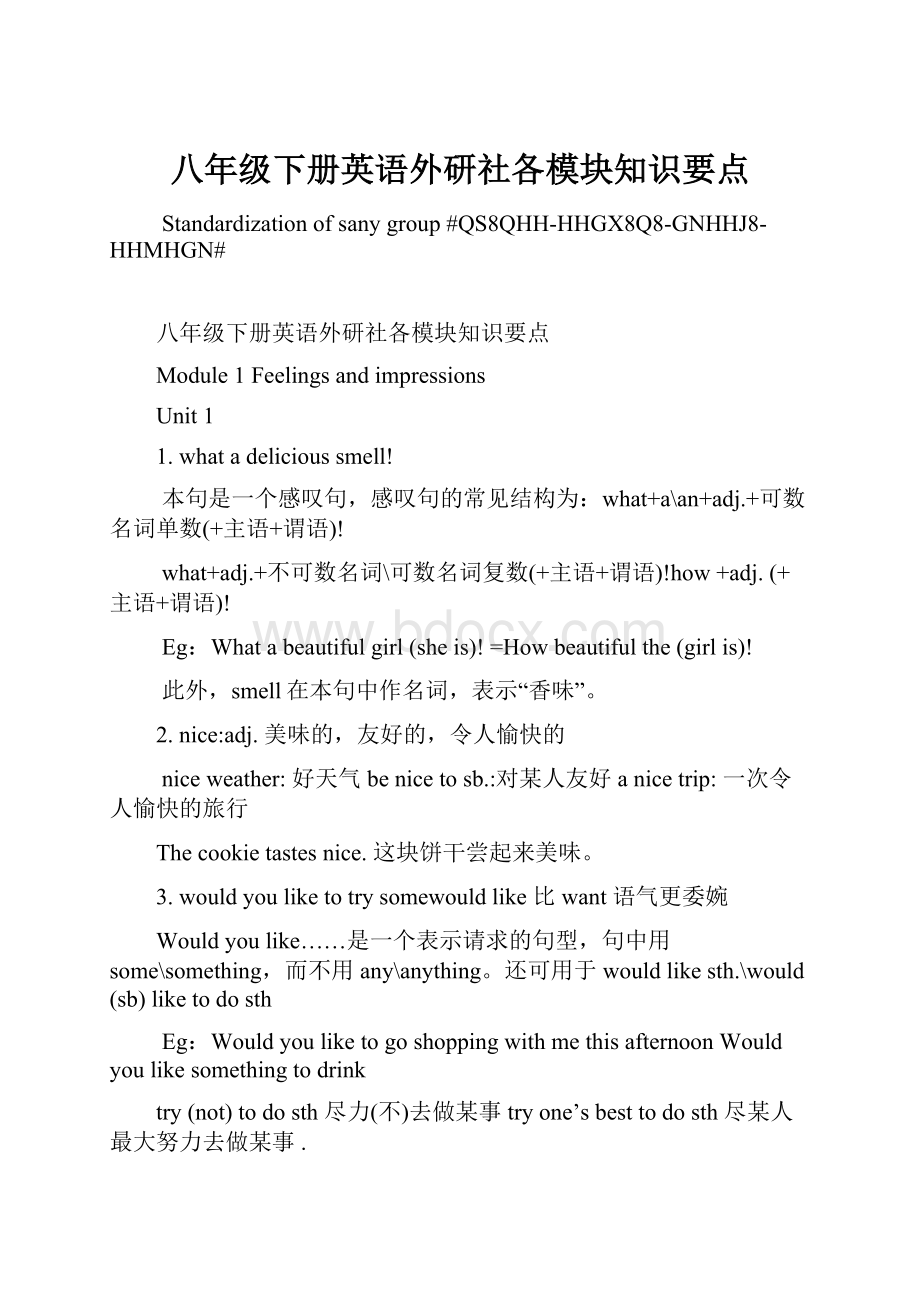八年级下册英语外研社各模块知识要点.docx
《八年级下册英语外研社各模块知识要点.docx》由会员分享,可在线阅读,更多相关《八年级下册英语外研社各模块知识要点.docx(47页珍藏版)》请在冰豆网上搜索。

八年级下册英语外研社各模块知识要点
Standardizationofsanygroup#QS8QHH-HHGX8Q8-GNHHJ8-HHMHGN#
八年级下册英语外研社各模块知识要点
Module1Feelingsandimpressions
Unit1
1.whatadelicioussmell!
本句是一个感叹句,感叹句的常见结构为:
what+a\an+adj.+可数名词单数(+主语+谓语)!
what+adj.+不可数名词\可数名词复数(+主语+谓语)!
how+adj.(+主语+谓语)!
Eg:
Whatabeautifulgirl(sheis)!
=Howbeautifulthe(girlis)!
此外,smell在本句中作名词,表示“香味”。
2.nice:
adj.美味的,友好的,令人愉快的
niceweather:
好天气benicetosb.:
对某人友好anicetrip:
一次令人愉快的旅行
Thecookietastesnice.这块饼干尝起来美味。
3.wouldyouliketotrysomewouldlike比want语气更委婉
Wouldyoulike……是一个表示请求的句型,句中用some\something,而不用any\anything。
还可用于wouldlikesth.\would(sb)liketodosth
Eg:
WouldyouliketogoshoppingwithmethisafternoonWouldyoulikesomethingtodrink
try(not)todosth尽力(不)去做某事tryone’sbesttodosth尽某人最大努力去做某事.
4.lovely:
令人愉快的,可爱的修饰人或物alovelyafternoon/girl
lively:
活泼的,生动的alivelylesson:
一堂生动的课
5.I’mafraidthat+从句:
恐怕(表示歉意或让对方失望的情况)
I’mafraidthatIcan’tcometoyourpartytomorrow.
6.1)abit=alittle:
有点儿,有点后接/形容词/副词
\形容词/副词的比较级
Ifeelabitthirstynow.
Aftertherain,peoplefeelabit/alittlecooler.
2)alittle+不可数名词:
Thereisalittletimeleft.
abitof+不可数名词:
ThereIsabitofwaterinthebottle.
7.haveatry:
试一试havea/an+名词
haveaswim:
游泳haveabreak:
休息haveashower:
洗沐浴
8.Ihaveasweettooth.我喜欢吃甜食。
9.bedone:
做好了,完成了done:
adj.做好了的,完成了
10.besure+从句:
Areyousurewhatyousaid
Besureof/aboutsth.:
对……确信I’msureof/aboutthetelephonenumber.
besure(not)todo.Sth.:
确保/务必(不)做某事Besurenottomisstheearlybus.
day:
幸运日You’realuckyboy.你是一个幸运儿。
Goodlucktoyou.祝你好运。
luck(n.)lucky(adj.)luckily(adv.)
youwanttotryapiecewanttodosthwantsb(not)todosth
apieceof……一张\条\片(apieceofpaper\advice)
Eg:
Iwanttobeanactorinthefuture.
13.therebe句型表示“某地有……”,其中be只有is\are,判断主谓一致时遵循就近一致的原则。
变成否定时在be后加not;变成一般疑问句时将be提至句首,肯定回答用Yes,thereis\are.否定回答用No,thereisn’t\aren’t.
Eg:
Thereisadeskandtwochairsinmybedroom.
【拓展】therebe句型在一般将来时中的应用:
Therewillbe……\Thereis(are)goingtobe……、Eg:
Therewillbeafootballmatchtomorrow.=Thereisgoingtobeafootballmatchtomorrow.
14.shallIgetthesugar
“shallIdosth”常用于表示sb主动提出做sth,表示征求他人意见,请求他人允许或向他人提出建议。
(shall通常跟第一人称连用)Eg:
Shallwegotothemovie
15.表示推测:
Itmightbe可能是……Itmustbe一定是……
表示推测,可能性的情态动词:
must﹥can﹥could﹥may﹥might(可能性从大→小)
16.speak+语言say+具体内容tellsbsth;tellsb(not)todosth
talkto\withsbaboutsth关于sth与sb交谈
Unit2
1.thanksfor=thankyoufor:
因……而感谢你
Thankyoufor/yourhelp.\sendingmephots.
welcometospWelcometoBeijing.Welcomehome---Thankyou!
---Youarewelcome.
2.message:
口信、信息(可数名词)takeamessage:
捎个口信leaveamessage:
留信
Information:
信息(不可数名词)apieceofinformation,someinformation
3.hearfromsb.=get/receivealetterfromsb.:
收到某人的来信
Iheardfrommyunclelastweek.=Igot/receivedaletterfrommyunclelastweek.
4.can’twaittodosth.:
等不及/迫不及待做某事
Ican’twaittoopenthepresent.
5.quite:
1)quitea/an+形容词+名词quiteaniceboy:
一个相当好的男孩。
2)quite修饰动词时放在动词前Hequitelikesmaths.他很喜欢数学。
very:
1)avery+形容词+名词averyniceboy
2)very与much合在一起修饰动词时,位于句末。
HelikesEnglishverymuch.
6.soundlike:
听起来(像)Themusicsoundsverybeautiful.
7.1)sb.spendsometime/money(in)doingsth.:
某人花费时间/钱做某事
Don’tspendtoomuchtime(in)playingcomputergames.
2)sb.spendsometime/moneyonsth.:
某人花时间/钱在某事/某物上
Ispenttenyuanonthisbook.Manypeoplespnedtheirfreetimeontheirhobbies.
8.beproudofsb./sth.:
以某人/某事为自豪Parentsareproudoftheirchildren.
We’reproudofourcountry.
9.begoodatsth./doingsth.=dowellinsth./doingsth.擅长某事/做某事
I’mgoodatEnglish/swimming.=IdowellinEnglish/swimming.
【拓展】begoodfor对…有益。
bebadfor对…有害。
begoodto=befriendlyto对…友好
Eg:
Smokingisbadforourhealth.Ourteacherisgoodtous,wealllikeher.
注意:
有a的表示肯定,无a的表示否定
10.Howdoyoufeelabout…=Whatdoyouthinkof…=Howdoyoulike…
Howdoyoufeelaboutthefilm=Whatdoyouthinkofthefilm
11.in:
在多久之后,常用于将来时,对其提问用howsoon
---HowsoonwillyouleaveBeijing
---I’llcomebackinthreedays.
12.howtodothings:
疑问词+不定式,在句中可作主语、宾语、表语
1)Idon’tknowwhattodo.=Idon’tknowwhatIshoulddo.(作宾语)
疑问词加不定式作宾语时可以转换成宾语从句。
2)Whentoholdthemeetinghasn’tbeendecided.(作主语)
3)Hisdreamishowtobeagoodscientist.(作表语)
4)Idon’tknowwhattodo.=Idon’tknowhowtodoit.
13.1)beafraidofsb./sth.:
害怕某人/某物I’mafraidofdoctors/dogs.
2)beafraidofdoingsth.:
害怕做某事I’mafraidofflying/goingoutatnight.
3)beafraidtodosth.:
害怕做某事I’mafraidtoswimacrosstheriver.
4)I’mafraidthat:
恐怕I’mafraidthatyoumuststudyhard.
14.“到达”的表达法:
gettospreach+spat+小地点(gethome\here\there)
15.表示“穿戴”:
wear+衣帽\饰物in+颜色\款式Puton穿上(动作)dresssb\oneself
【辨析】aswell\too\also\either:
aswell肯定句,放句末,前面不加逗号。
too肯定句或一般疑问句,放句末,前面常加逗号。
also肯定句,放句中。
either否定句,放句末,前面常加逗号’malwayssorrywhenIdon’tknowhowtodothingsintheright……
howtodosth是“疑问词+动词不定式短语”,在句中作know的宾语
Eg:
Idon’tknowwhattodonext.
17.asksb(not)todosthhelpsb(to)dosth=helpsbwithsth
18.whatdoessb\sthlooklike用于询问某人或某事的外貌或外部特征
What’ssb\sthlike用于询问某人或某事的性格或特征
Eg:
---WhatdoesMarylooklike---Sheisthin.
---What’sTomlike---Heisshy.
指三个及以上中的另一个。
Theother指两者中的另一个。
Someoneelse表示其他的人。
20.noisy(adj.)吵闹的.noise(n.)噪音(不可数)。
noisily(adv.)吵闹地。
makemuchnoise.发出很多噪音。
much\even+比较级
语法:
表示感觉和知觉的系动词也称感官系动词
1.五个表示感觉和知觉的系动词与眼、耳、口、鼻、手相关系。
look,sound,taste,smell,feel+形容词Hefeelstiredafterwork.
2.感官系动词后可接介词like,like后常接名词。
Hisideasoundslikefun.
3.感官系动词的句型结构与be不同,其否定形式和疑问形式要借助动词do。
Thefoodtastesdelicious.变成否定句→Thefooddoesn’ttastedelicious.
变成一般疑问句→Doesthefoodtastedelicious
4.持续系动词,用来表示主语继续或保持一种状况或态度,主要有keep,remain,stay
Theweatherwillkeepwarmfor7days.
5.变化系动词有become,grow,turn,get,go等。
Module2Experiences
Unit1
1.1)enter=takepartin=joinin参加enteracompetition:
参加比赛
2)enter=come/gointo进入Pleaseentertheclassroom.
2.ever:
曾经、从来,用于现在完成时的一疑问句、否定句。
1)Have/Hassb.ever+donesth.某人曾经做过某事吗
Haveyoueverenteredaclub
2)ever用于否定句,notever=never从来
Shehasn’teverenteredanycompetitions.
3.beforeadv.以前,与现在完成时连用;也可与一般过去时/一般现在时连用,位于句末。
ShehasneverbeentoBeijingbefore.
Turnoffthelightbeforeyouleavetheroom.
Hecamebackbefore10o’clocklastnight.
4.1)afford:
买得起、付得起,常与can,could,beableto连用。
Thehouseistooexpensive.Ican’taffordit.
2)afford后跟动词不定式作宾语,canaffordto/dosth.:
有能力支付做某事
\buysth.:
买得起某物
IcanaffordtovisitShanghaithisyear.
Heisverypoorandcan’taffordtobuyahouseinthecity.
5.That’sapity.Whatapity!
真遗憾!
It’sapitythat:
太可惜了It’sapitythatyoucan’tcometotheparty.
6.here,there,out,in等表示方位的副词开头的句子中,主语是名词,句子要全部倒装;
如果主语是代词,句子则要部分倒装。
Hereisagiftforyou.Herecomesthebus.(主语是名词)
Hereitis.Hereyouare.(主语是代词)
7.不定式短语在句中作目的状语,位于句首或句中。
Tocatchtheearlybus,Igetupearly.(位于句首,其后有逗号)
Hestudiedhardtopasstheexam.(位于主句后即句末)
8.Sheworriedaboutherfuture.=She_______________aboutherfuture.
9.makeup:
编造,组成Canyoumakeupastory
bemadeupof:
由……组成Thebasketballteamismadeupof20players.
10.1)Ihopethat(宾语从句)表示祝愿:
Ihopethatmydreamwillcometrue.
2)hope/wishtodosth.:
Iwishtobecomeadoctorinthefuture.
3)wishsb.todosth.:
Iwishyoutocometomybirthdayparty.
11.1)invitesb.todosth.:
邀请某人做某事Lilyinvitedmetoseeafilmyesterday.
2)invitesb.tosomeplace:
邀请某人去某地I’llinviteLillytomyparty.
12.competition(n.)比赛competewithsbforsth为了sth与sb竞争
competitive(adj.)有竞争力的competitor(n.)竞争者
13.kindadj.善良的,和蔼的kindness(n.)善良
n.种类:
akindof一种allkindsof各种各样
Eg:
Heisakindboyandoftenhelpsothers.Thereareallkindsofthingsinthesupermarket.
14.helpsb(to)dosth=helpsbwithsthimprove(v.)提高,改善improvement(n.)
Eg:
InordertoimprovemyEnglish,mybrotherhelpsmewithmyhomeworkeveryday.
15.maybe也许,大概(常放句首)maybe可能是(常放句中)
Eg:
Maybeyouareright.Youmayberight.
16.win+比赛赢得……(win—won—won)beat+对手(sb)打败……(beat—beat—beaten)
Eg:
Atlast,hewonthegame.Webeatthematchess.
17.thefirstprize一等奖thesecondprize二等奖
18.dreamof/aboutdoingsth梦想做某事affordtodosth有能力支付做某事
Eg:
Hedreamsofbecomingascientist.Ican’taffordtobuyanewcomputer.
19.Haveyoueverwonanyprizesbefore
Have/Hassbever+过去分词+其他用于询问某人是否做过某事,回答用yes/no.
Eg:
---HaveyoueverbeentoBeijing---Yes,Ihave./---No,Ihaven’t.
20.stoptodosth停止去做某事stopdoingsth停止做某事
Eg:
Stoptalking!
Youlooktired,whynotstoptohavearest
Eg:
Itisapitytofailintheexam.Itwasapitythatwemissedthewonderfulmatch.
11.mean(v.)意思是,意味着meantodosth=plantodosth
meaning(n.)意思themeaningof…………的意思
Eg:
DoyoumeantogotoHainanIslandforholidaythisyear
22.动词不定式todo结构在句中可以作目的状语之外,还可以作宾语、宾语补足语。
Eg:
Tocatchthebus,Ihavetogetupearly.
Hedecidestostudyhardthisterm.
Theteacherasksustotakenotesinclass.
23.Don’tworry!
不要担心!
worry担心;为……担心worryabout=beworriedabout担忧
26.called=named被叫做……(过去分词充当定语)Eg:
Thereisagirlcalled/namedLucyinmyclass.
Unit2
1.数词-名词-形容词:
合成/复合形容词,其中的名词必须用单数形式,只能放在名词前做定语,不能作表语。
Tomisaneight-year-oldboy.Tomiseightyearsold.
2.oneof+the形容词最高级+名词复数形式:
最……之一
TheYangzeRiverisoneofthelongestriversintheworld.
3.movetosp.:
搬到某地TheyaremovingtoBeijinginamonth.他们一个月后要搬到北京。
workwithsb.与某人一起工作
workfor……为……工作(for后面通常为公司)sendsb.tosp.把某人送到某地
sendsb.todosth.:
派遣某人做某事Theysentsomescientists